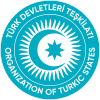The Turkic term oğuz or oğur (in z- and r-Turkic, respectively) is a historical term for "military division, clan, or tribe" among the Turkic peoples. With the Mongol invasions of 1206–21, the Turkic khaganates were replaced by Mongol or hybrid Turco-Mongol confederations, where the corresponding military division came to be known as orda.
Background
The 8th-century Kul Tigin stela has the earliest instance of the term in Old Turkic epigraphy: Toquz Oghuz, the "nine tribes".
Later the word appears often for two largely separate groups of the Turkic migration in the early medieval period, namely:
The stem uq-, oq- "kin, tribe" is from a Proto-Turkic *uk. The Old Turkic word has often been connected with oq "arrow"; Pohl (2002) in explanation of this connection adduces the Chinese T'ang-shu chronicle, which reports: "the khan divided his realm into ten tribes. To the leader of each tribe, he sent an arrow. The name was 'the ten she', but they were also called 'the ten arrows'." An oguz (ogur) was in origin a military division of a Nomadic empire, which acquired tribal or ethnic connotations, by processes of ethnogenesis.
See also
References
- Sergei Anatolyevich Starostin, Turkic etymology (Online Etymological Database Project), citing VEWT 511, ЭСТЯ 1, 582-583, Егоров 76. Starostin thought the connection with "arrow" was made "erroneously".
- the "arrows" connection was first reported by Édouard Chavannes, Documents sur les Tou-kiue (Turcs) occidentaux, 1900.
- ^ Walter Pohl, Die Awaren: ein Steppenvolk im Mitteleuropa, 567-822 n. Chr, C.H.Beck (2002), ISBN 978-3-406-48969-3, p. 26-29.
- Karoly Czeglédy, On the Numerical Composition of the Ancient Turkic Tribal Confederations, Acta Orient. Hung., 25 (1972), 275-281.
Further reading
- Golden, Peter; Bosworth, C. Edmund (2002). "ḠOZZ". Encyclopaedia Iranica, Vol. XI, Fasc. 2. pp. 184–187.
- Golden, Peter B. (2020). "Oghuz". In Fleet, Kate; Krämer, Gudrun; Matringe, Denis; Nawas, John; Rowson, Everett (eds.). Encyclopaedia of Islam (3rd ed.). Brill Online. ISSN 1873-9830.
